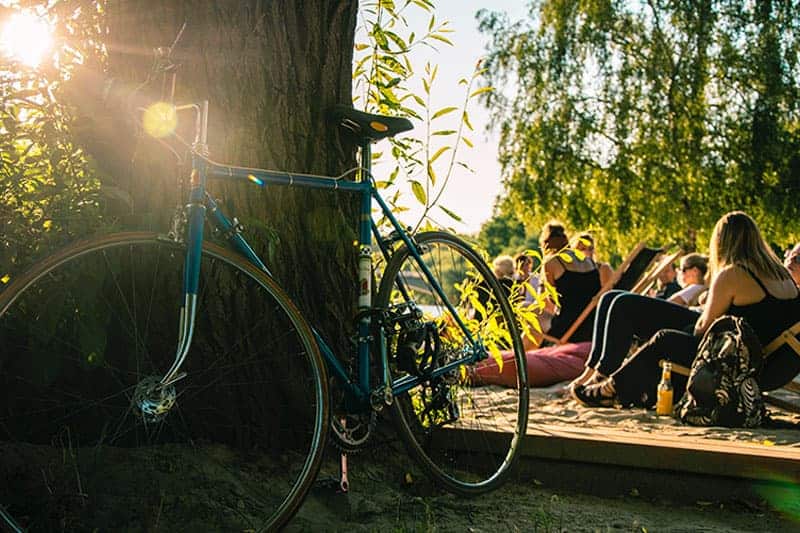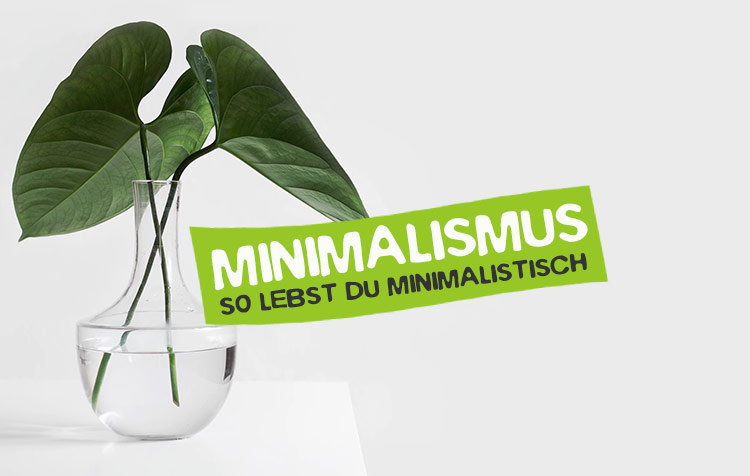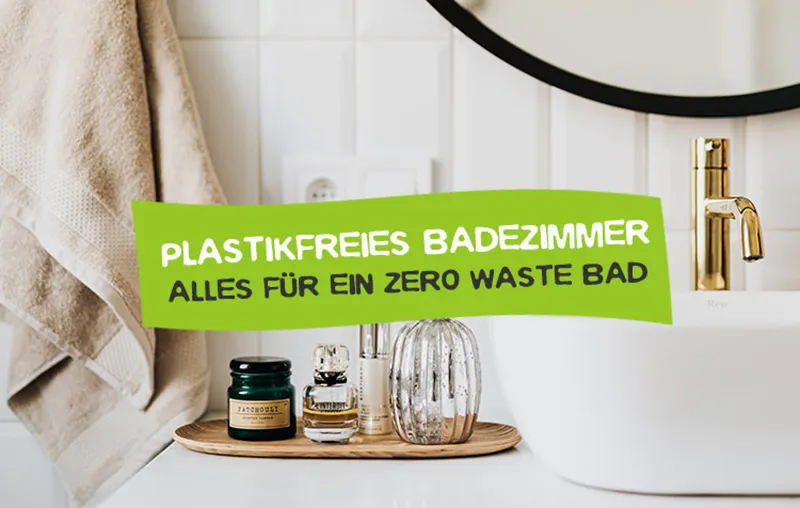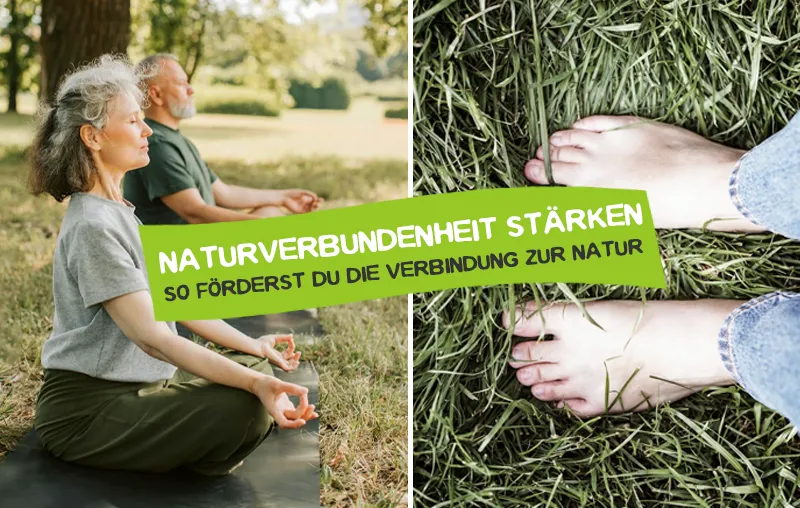Can you save money sustainably by living as environmentally consciously as possible? That's a question that I can answer with a double and triple YES carved in stone! Saving money actually means actively putting something aside every day - for example, to buy Fulfill dreams to be able
But it's even cooler to automatically spend less money by adopting a sustainable lifestyle and save money in the process. This is passive saving 2.0, so to speak. 🙂
In this article, I would therefore like to give you my best money-saving tips for everyday life based on a sustainable lifestyle along the way. These are also the reasons why I firmly believe that sustainability is actually good value. Let's go!
Important: We often hear that an environmentally friendly lifestyle is too expensive. This may be true in the short term from time to time. But if you learn to think sustainably, you will spend much less money over the long term. So please share this article with people who think an environmentally friendly life is too expensive.
20 reasons: Why does a sustainable lifestyle save you money?

Everyone would like to Put some money aside each monthto turn individual wishes into reality at some point. It doesn't always work out.
However, one effective way is to simply spend less and still enjoy a real quality of life. Because Having a lot does not automatically mean that everything is great.
The following reasons for saving money sustainably by living as consciously and naturally as possible are your Opting for a long-term sustainable lifestyle further reinforce the effect.
1. people who think sustainably consume more consciously
Let's start with a basic argument: Just because there's money doesn't mean you have to spend it. If you think sustainably, you save Money for the finer things in life and does not spend it on absolutely superfluous things.
If you have the Nature at heart wear, then you consume more consciously - and only buy the things you really need. By scrutinize potential purchases and suppress impulse buyingyou will end up buying significantly less and saving a lot of money in the future.
Tip: I have compiled a list of recommended green online stores put together for you. If you order something on the Internet, then Avocado Store* & Co is the ideal point of contact.
2. save energy and therefore money
The share renewable energies at Electricity mix in Germany is currently at about 57 percent.₁ The Switch to a green electricity tariff* and targeted electricity savings are key reasons why environmentally conscious people reduce their living costs by living sustainably.
Whether LED lamps in the apartment or the Quick closing of the refrigerator. Even in the car, the Air conditioner instead, the cooling airflow is used when the window is open - this saves energy. sustainable driving Fuel and money.
The best examples are Energy-saving houses with good ecological insulation and a PV system that uses the sun as an infinite source of energy and minimizes the electricity bill.
Tip: How you Save even more energy in the household I'll show you how to do that in the linked post.
3. drink tap water instead of expensive mineral water
Did you know that Tap water up to 250x cheaper than mineral water from a plastic bottle?1 In Germany, we enjoy the privilege of having running, drinkable water in our homes.
By preferring tap water, you may also save yourself the Drive to the beverage market and counteract the money-grabbing drinking water companies that operate in many regions of the world. Water Shortage provoke.
So just get yourself one of these reusable Stainless steel drinking bottle* and fill it up again at home or on the go at public drinking water points or on request in a café (free of charge).
4. save a large proportion of household water costs
As an environmentally conscious person, I do drink a lot of tap water, but I also take care to use a low water consumption.
For example, I take shorter showers, turn the shower off when soaping up and use the dishwasher and washing machine in eco mode when they are fully loaded. I take a cold showerinstead of hot. In addition to many liters Save water I then also use thermal energy.
Also the I was able to significantly reduce water consumption in the garden. For example, I catch Free rainwater in this rustic old wine barrel* and let the lawn grow higher so that it needs to be watered less often.
5. less waste in the household saves money
Environmentally conscious people are often also advocates of a waste-avoiding lifestyle. This means that less waste is produced. Plastic waste is reduced and organic waste on the Compost recycled into free fertile soil. This also offers the opportunity to Fees for waste disposal to lower.
Tip: Even more Zero Waste Tips can be found in the linked article. For a good start, I can also recommend my Book "Plastic-free living for beginners "* recommend
6. food is consumed more consciously
People with high Environmental Awareness consume food more consciously. Many of them live vegan or eat a vegetarian diet - and do without meat.
In high quality, this is often very expensive, while plant-based products such as Rice, pasta, potatoes or lentils are among the cheapest foods in the world.
There are also more and more Self-cateringwho grow their own food at home or in a community farm. This also saves money in the long term, promotes environmental protection and social interaction.
Tip:e If you don't really know where to start, I can warmly recommend the Online course "Going vegan for beginners "* recommend
7. larger purchases are more durable and efficient
For example, when I look at buy a refrigeratorAs an environmentally friendly person, I prefer to invest in energy-efficient and durable appliances. I can recommend the refrigerator, for example "Siemens KG39NAIAT "*which was rated by Stiftung Warentest as most energy-efficient model was awarded.
The necessary natural resources used for longer - and I save myself large parts of the Energy costs. In the end, of course, my wallet is happy too.
8. second hand purchases are cheaper
By buying things second-handis used in addition to natural resources for new production of course also saved money in the long term!
For example, you can get cheap clothes and do without inferior cheap fashion at the same time from the Fast Fashion Industrywhich is quickly thrown away and bought again.
And the best thing is: second hand is of course a real money-saving tip not only for garments. Here are a few contact points you can use:
- Medimops* (e.g. for used books, movies, music CDs and console games)
- ebay classifieds (basically for every product category)
- Amazon* (basically for every product category)
- eBay* (basically for every product category)
9. old contracts are regularly reviewed
Those who think more long-term and sustainably usually pay a little more attention to this, for what the well-earned and perhaps hard-saved money is spent. That is the core of a frugal lifestyle.
Old contracts often result in high costsalthough the services are now significantly cheaper. You should therefore check your regular direct debits from your account to reduce costs if necessary and thus save money in the long term.
For example, it is particularly evident with a Switch to green electricity* or to a Ecobank enormous savings potential and at the same time you can also ensure that the money Sustainable investment will.
10. environmentally conscious people vacation differently
Those who consciously live sustainably are less likely to fly halfway around the world by plane and instead appreciate the Nature in Germany and Europe. How about a trip to Kochel am See in Bavaria or to Saxon Switzerland, for example?
Shorter travel distances ensure that money is also saved in connection with vacations. In addition much more time in nature a place where you are more likely to spend relaxing Sounds of nature than spending money.
Tip: If you don't have an alternative to flying, be sure to use the advice in the article about the Flying as sustainable as possible.
11. save money with a cup of coffee

Converted, one kilogram costs Coffee from capsules 70 euros and leaves behind around 8,000 tons of plastic waste every year.2 Would you ever buy another capsule coffee with this knowledge? People who live an environmentally conscious lifestyle prefer to buy Fairtrade coffee beans*which is of course still significantly cheaper per cup.
Tip: Coffee is also often cheaper in many cafés if you bring your own. CoffeeToGo mug* or drink the coffee on site.
12. saving CO2 and money in mobility
Even for everyday journeys, I generally prefer inexpensive and environmentally friendly routes with the lowest possible CO2 emissionsto get from A to B.
The Long distance bus for example, is usually much cheaper than the domestic flight. Also Train journeys booked early* are often cheaper and not as time-consuming as you might think. Many people these days don't even have a CarThis saves money in use (e.g. fuel, insurance, repairs) as well as the often high costs of purchase.
Tip: At Article about car-free living you can find out how you can manage completely without your own car if possible. This much in advance: it doesn't always work, but in many cases 🙂
13. shared car journeys are cheaper
Poor bus and train connections are probably the most common reason why people dependent on their car are. But even in such cases, you can of course save money in a sustainable way. For example, by Carpooling uses them or offers them itself.
This automatically improves the eco-balance of all passengers - and everyone saves money. Of course, the same applies to the Carpoolingfor example for the sustainable way to work and back.
14. save money with a natural garden
I have already mentioned the water-saving potential of greenery. Through Tall grass the floor dries in my Natural garden for example, does not run out so quickly and indigenous plants are also not as irrigation-intensive.
I also rely on Free fertilizer (e.g. coffee grounds and home-made compost) and natural pest control (e.g. ladybugs against aphids), so I hardly have to spend anything on garden maintenance. As the garden is a natural paradise, we even go on vacation less often, which also saves money in the long term.
Tip: Be sure to take a look at my tips for sustainable gardening or get the best ideas directly for your inexpensive garden from.
15. less disposable, more durable
In this money-saving tip for everyday life, the waste-avoiding one plays the most important role, plastic free lifestyle a role. Why do you actually give a lot of money every time for disposable products such as cotton pads, razors, straws, OB's, plastic bags and even disposable barbecues?
The economical alternative, which doesn't make the industry laugh every day, is the Reusable products obvious.
Here are a few reusable and significantly more favorable examples in the long term:
- Fabric cotton pads* instead of disposable pads.
- Stainless steel safety razor* instead of disposable razors.
- Glass drinking straws* instead of plastic.
- Menstrual cup* instead of tampons.
- Jute bag* or Backpack made from marine litter*instead of plastic bags.
- Electric barbecue (Enders)* instead of a disposable grill.
All these things are eternal reusable and save an incredible amount of money over their lifetime. What you could do with them... 😉
16. few home remedies instead of many chemical pistols
You need of course not a different cleaner for each cleaning activity to buy. With Baking soda, Washing soda, Vinegar, Citric acid and also Curd soap you may have already seen some of the Home remedy with you, which will save you high costs for countless household cleaners.
Here you can find some cheap Tips and DIY examples for your household:
- Soda applications in the home
- Using washing soda in the household
- Use citric acid
- Make glass cleaner yourself
- Make oven cleaner yourself
- Making washing up liquid from ivy yourself
Tip: Let yourself be guided a little in the DIY household blog inspire.
17. borrow, repair and do it yourself instead of buying new
Buying new is expensive, but sustainable alternatives such as renting are not. Borrow, for example, the Drilling machine from the neighborhood instead of buying them yourself. Sharing things has finally come back into fashion (also thanks to the sharing economy).
In addition, repairs (e.g. a Refurbished smartphonehave a look at reBuy* after), barter transactions (e.g. on the Plant exchange) and DIY ideas (e.g. Dining table made from a Euro pallet) are increasingly making expensive new purchases superfluous. By giving existing materials greater value again, you can also save money in the long term.
18. reusable cloth towels are used
Classic cloth towels are a good way to save money on disposable towels. Even my grandpa always had a washable Cloth handkerchief* in your pocket - it makes the No need to buy paper tissues. That's why the cloths also belong in the list of most sustainable lifehacks of our grandparents. 🙂
You don't need the classic roll of kitchen paper either, as you can simply replace it with reusable paper towels. Cotton kitchen towels* can replace.
19. people who think sustainably are health-conscious
Not only the ecological but also the sustainably healthy lifestyle helps to save a lot of money. By quit smoking or don't start in the first place, you avoid the costs of increasingly expensive Cigarettes and ensure that fewer Butt butts in the environment land.
This is a great example of how a sustainable everyday life promotes your own health and that of our environment. I personally follow this principle, only spend money on things that are good for me. This also saves me any treatment costs for illnesses in the long term.
20. free bike instead of fuel and ticket costs
Who regularly rides a bicyclesaves the money for the Refuel of the car or the Tickets to use public transportation. Riding your own bike is simply free and also super flexible. If you think environmentally friendly, you can also save a lot of money on your everyday mobility.
Living environmentally conscious and saving money is easy!

You have now learned many tips for saving money with a sustainable lifestyle. As you have noticed, you save money above all by Sustainable in the long term and not in the short term think.
I hope that these money-saving tips for everyday life will help you to have a little more left over at the end of the month in future. For example, for a nice weekend getaway in Germany's unique nature 🙂
"The world has enough for everyone's needs, but not everyone's greed."
Mahatma Gandhi (more at Wealth Quotes)
Do you have any questions, tips or your own experiences with saving money through an environmentally conscious lifestyle that you would like to share? Then please leave me a comment.
Stay sustainable,

PS: Be sure to look a little more in the Blog about sustainable living around. For example, in one of the articles you will find out how you can implement your own business idea and Founding sustainably simply by following your heart.
References:
- ECOVENTA GmbH: Plastic is not fantastic. The sustainable alternative to tap water. (as at: 15.09.2017). https://veggienale.de/plastik-ist-nicht-fantastisch-die-nachhaltige-alternative-leitungswasser. [17.10.2024]. ︎
- Nicolai, B.; Axel Springer SE: Nespresso will not let go of aluminum (as of 14.11.2017). https://www.welt.de/wirtschaft/article170606900/Nespresso-will-nicht-vom-Aluminium-lassen.html. [17.10.2024]. ︎





Hello, I find your tips really helpful. I have already changed my lifestyle in part. For example, no plastic bags, buy children's clothes rarely new, properly separate waste, avoid garbage. .... When something breaks in the household, it is replaced if it is important. Of course, no longer made of plastic. Unfortunately, I catch myself but again and again in the old pattern to buy cheap to fall. But I have already changed a lot this year and every small step is a success.
Love greetings Romana
Hi Romana! Great, thanks for your feedback. It's not a bad thing to fall into "old patterns". If you're improving slowly but steadily and can already feel the improvement, you're well on your way 🙂
Many greetings,
Christoph